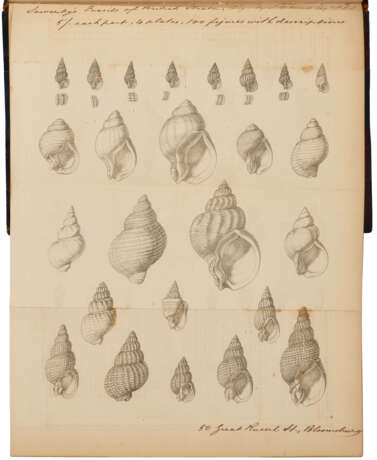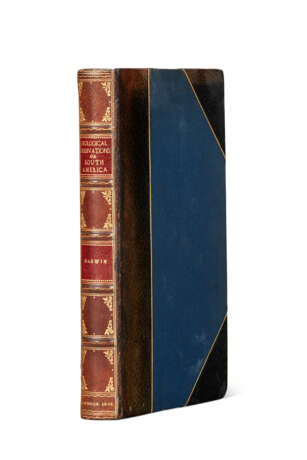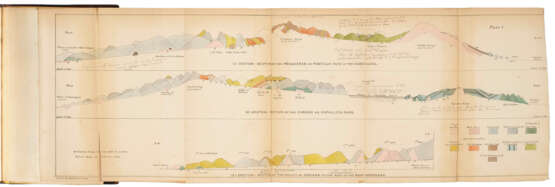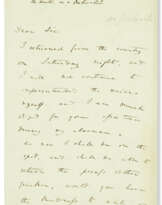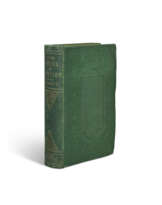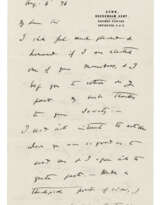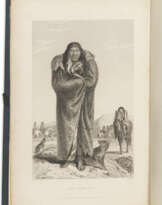ID 1032682
Lot 30 | Geological Observations on South America
Valeur estimée
$ 20 000 – 30 000
First edition, a significant presentation copy to Sir Andrew Crombie Ramsay (1814–1891). Ramsay was President of the Geological Society and later Director General of the Geological Survey. Darwin had an extensive correspondence with Ramsay over many years. This present work "drew together all the geological and palaeontological results of Darwin’s travels through [South America] ... reflecting the influence of Lyell’s Principles of Geology (1830–33) and a commitment to Lyell’s idea of gradual geological change taking place over immensely long periods of time; a commitment that transcended Darwin’s purely geological thought and influenced his speculations in all fields of natural history. But despite this clear and acknowledged debt, Darwin’s independence of mind was never in doubt and is well evidenced by the skilled and determined defence of his theories he invariably made against rivals of whatever standing ... Darwin pursued an argument against the French palaeontologist Alcide d’Orbigny, insisting that the vast pampas formation could not have been laid down at a single moment through the action of a great debacle, as Orbigny proposed" (Correspondence, vol 3, pp xv-xvi; see also Browne, vol 1, p 454; Life & Letters, vol 1, pp 326-7). Darwin published two other volumes of geological researches from the voyage of the Beagle: The Structure and Distribution of Coral Reefs, in 1842, and Geological Observations on the Volcanic Islands, in 1844. This third volume is the rarest of the three—fewer copies were printed at the time (see Norman and Correspondence, vol 13, p 365). This copy contains an extra plate captioned in ink "Sowerby’s fossils of British strata." This same plate and inscription is present in a few other known copies including another presentation copy, one for Ramsay's colleague in geology. David Thomas Ansted, 1814–1880 (see W.P. Watson catalogue 13 [2003], no. 14).
Darwin and Ramsay's extensive correspondence began in 1846, occasioned by the publication
Geological Observations. The correspondence lasted until 1880; 38 letters are recorded. Darwin and Ramsay often met, both at the Geological Society and socially, often dining with the Lyells. The very first letter from Darwin informs Ramsay that he is sending him this copy of the Observations; it begins: "Dear Sir, Having just read your excellent memoir on Denudation, I have taken the liberty to send you a copy of my volume on S. America, finding that we have discussed some related questions.— I wish I had profited by your memoir before publishing my volume.— I see that we entirely agree on the sea’s great power compared with ordinary alluvial action, & likewise on the frequency of grand oscillations of level & on several other points. If you had time to read parts of my volume, I should much like to discuss with you many cases, such as my notion of subsidence being necessary for the formation of high sea-cliffs, as inferred from the nature of the sea’s bottom off them, likewise the horizontal elevation of the Cordillera, as inferred from the sloping gravel fringes in the valleys —on the non-horizontality of lines of escarpments round old bays, &c &c— ..." (DCP-Lett-1008). A week before, Darwin had written to Lyell about Ramsay’s memoir referred to above, and ends his letter: "I shall send him my S. American Vol. for it is curious on how many similar points we enter." Darwin’s next letter begins: "I am delighted that you have thought parts of my Book worth reading: it is in my opinion much more difficult to get a geologist to read a book than to write one..." (DCP-LETT-1038).
Darwin sent a copy of the first edition of the Origin to Ramsay, and it is worth citing Ramsay’s reply in full: "21. Feb. 1860 / I had for years been using to myself the terms mutability of species, and transmutation of species, for want of better words to express the feeling, (amounting to a conviction) that in Time species passed insensibly into each other instead of being produced by separate acts of creation. But the idea implied by your principle of Natural Selection taken in connection with the struggle for existence is very different indeed from the vague groping towards the light in which myself and others with various degrees of hesitation indulged. My faith such as it was, was founded on the following considerations. The disputes among Naturalists as to what constitutes a species, the wranglings as to whether such & such were distinct species or varieties, the acknowledgement of permanent varieties, the existence of specific & still more of generic centres, of representative species in space, & in time in a geological sense, & the links (especially the rudimentary organs) that bind genera together, especially in the higher Mammalia, when living & fossil forms are considered together. The succession of small miracles required to produce certain species in a formation just a very little different from those in the preceding formation went sadly against my mental stomach & I never could reconcile myself to the idea of a Creator making a number of small experiments as it were of feeling his way in the work of Creation— And when asked where are the perfect gradations, that show the passage of fossil species, I have always maintained that the record as shown in the succession of formations was too imperfect for us to find this & that it is not till an aberrant branch, multiplied to a vast extent, that we were likely to find fossilized any of its representatives at all." (DCP-LETT-2706A). Darwin replied: "I am extremely much pleased to hear that you like my Book. I look at every geological believer of the mutation of species as a most important gain.— There will be a long & stiff battle before such doctrines are generally admitted. The progress of subject will now depend far more on such men as yourself than on anything I can do.— You put, as it seems to me, the general arguments against the eternal immutability of species with great clearness.—With very sincere thanks for your note. | Believe me | Yours very truly | C. Darwin" (DCP-LETT-2711). Almost all of Darwin’s letters to Ramsay are lengthy and detailed discussions of geological matters, and show Darwin’s profound engagement with one of Great Britain’s greatest geologists. "Ramsay was a considerable traveller, visiting the continent several times, and North America in 1857. He was an active climber, admirable lecturer, lucid writer, and jovial raconteur. He was a devout Christian, but readily accepted the ideas of Darwin and Lyell. However, while an outstanding field geologist, Ramsay was somewhat unsympathetic towards laboratory studies and is recorded as saying that he didn't believe in looking at a mountain with a microscope." (ODNB). Freeman 273; Norman p 213. See Archibald Geikie, Memoir of Sir Andrew Crombie Ramsay, 1895.
Octavo (217 x 134mm). With five folding plates, one of which is hand-colored, and a folding map; plus an extra folding plate captioned in manuscript "Sowerby’s fossils of British strata, by S.V. Wood..." and bound in at end (plates with minor splits to folds or some creased edges from folding, one short marginal tear not affecting images). 32-page publishers' catalogue dated July 1846. Late 19th century half morocco gilt, spine gilt in compartments, red morocco lettering pieces (spine faded, joints and extremities scuffed). Provenance: Sir Andrew Crombie Ramsay, 1814–1891 (ownership signature on flyleaf recto; presentation inscription "From the Author" in secretarial hand on the same flyleaf verso).
| Adresse de l'enchère |
CHRISTIE'S 20 Rockefeller Plaza 10020 New York Etats-Unis | ||||||||||||||
|---|---|---|---|---|---|---|---|---|---|---|---|---|---|---|---|
| Aperçu |
| ||||||||||||||
| Téléphone | +1 212 636 2000 | ||||||||||||||
| Fax | +1 212 636 4930 | ||||||||||||||
| Conditions d'utilisation | Conditions d'utilisation | ||||||||||||||
| transport |
Service postal Service de messagerie ramassage par vous-même | ||||||||||||||
| Modes de paiement |
Virement bancaire | ||||||||||||||
| Heures d'ouverture | Heures d'ouverture
|
